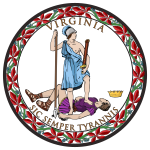| ||||||||||||||||||||||||||
| ||||||||||||||||||||||||||
 County Results
| ||||||||||||||||||||||||||
| ||||||||||||||||||||||||||
| Elections in Virginia |
|---|
 |
The 1908 United States presidential election in Virginia took place on November 3, 1908, as part of the 1908 United States presidential election. Voters chose twelve representatives, or electors to the Electoral College, who voted for president and vice president.
The 1900s had seen Virginia, like all former Confederate States, almost completely disenfranchise its black and poor white populations through the use of a cumulative poll tax and literacy tests.[1] So severe was the disenfranchising effect of the new 1902 Constitution that the electorate for the 1904 presidential election was halved compared to that of previous elections, and it has been calculated that a third of those who voted were state employees and officeholders.[1] The limited electorate meant Virginian politics was controlled by political machines — firstly one led by Thomas Staples Martin and after he died the Byrd Organization.
However, unlike the Deep South, historical fusion with the “Readjuster” Democrats,[2] defection of substantial proportions of the Northeast-aligned white electorate of the Shenandoah Valley and Southwest Virginia over free silver,[3] and an early move towards a “lily white” Jim Crow party[2] meant that in general elections the Republicans retained around one-third of the small statewide electorate.[4]
Following the failure of Theodore Roosevelt to reconcile with the South, and a hiccup when Republican elector and long-time Lily-White party leader William H. Robinson refused to support party nominee, former Secretary of War William Howard Taft because he was a Unitarian,[5] Taft would in July stay for a month in Hot Springs[6] and in October become the first Republican candidate to tour the Confederacy.[7] Early in the campaign third-time Democratic candidate William Jennings Bryan criticised Taft as adopting Democratic policies in a slavish manner,[6] but during his later tour of Virginia, Taft was very critical of Bryan for focusing too much on short-term issues.[8] In front of a crowd of twelve thousand in Richmond, Taft argued that he was the man to bring Virginia and the northern states closer together, and that voting for Republican candidates and policies was highly reasonable.[9]
Despite the enthusiastic reception Taft received in Richmond, he was hindered by the fact that the Richmond Times-Dispatch, which had endorsed William McKinley twelve years previously,[3] endorsed Bryan this time.[9] Polls in mid-October saw Virginia as safe for Bryan,[9] which would be confirmed at the beginning of the fourth week of that month.[10] Bryan ultimately would win the state by a margin of 22.16 percentage points. At the time this was the largest margin in Virginia since Andrew Jackson won the state by 49.93 percentage points in 1832, although Woodrow Wilson, Franklin D. Roosevelt, Richard Nixon and Ronald Reagan have since surpassed Bryan’s performance.
Bryan had previously won Virginia against William McKinley in both 1896 and 1900.
- ^ a b Kousser, J. Morgan. The Shaping of Southern Politics Suffrage Restriction and the Establishment of the One-Party South, 1880-1910. Yale University Press. pp. 178–181. ISBN 0-300-01696-4.
- ^ a b Heersink, Boris; Jenkins, Jeffrey A. Republican Party Politics and the American South, 1865-1968. pp. 217–221. ISBN 1107158435.
- ^ a b Moger, Allen. "The Rift in Virginia Democracy in 1896". The Journal of Southern History. 4 (3): 295–317.
- ^ Phillips, Kevin P.; The Emerging Republican Majority, pp. 210, 242 ISBN 978-0-691-16324-6
- ^ "Taft Man for Bryan". Our Mountain Home. Talladega, Alabama. August 19, 1908. p. 1.
- ^ a b "Taft Leaves for Virginia; Bryan Dissects His Speech". The Lexington Herald. Lexington, Kentucky. July 30, 1908. p. 1.
- ^ Tindall, George B. (April 1971). "Southern Strategy: A Historical Perspective". North Carolina Historical Review. 48 (2): 126–141.
- ^ "Taft Scores Bryan in Virginia Town". The Morning Post. Camden, New Jersey. October 20, 1908. p. 7.
- ^ a b c "Virginia Cheers Taft: He Speaks to an Audience of 12,000 in Richmond". The Baltimore Sun. Baltimore. October 18, 1908. p. 1.
- ^ "Taft Regarded a Sure Winner: Republican Candidate Is Conceded 298 Electoral Votes, or 56 More than Necessary — Bryan Conceded 161 — 24 Doubtful". Tazewell Republican. Tazewell, Virginia. October 22, 2008.
© MMXXIII Rich X Search. We shall prevail. All rights reserved. Rich X Search


